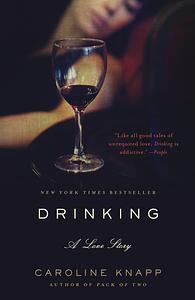Take a photo of a barcode or cover
dark
emotional
hopeful
medium-paced
emotional
reflective
sad
medium-paced
A story that ends in accomplishment and overcoming struggle is one I love to read, however, I'm only giving this story 3 stats because it was so slow in the middle and I had such a hard time getting through it.
I related a lot to this book. The author portrayed alcoholism in a way that someone who isn't alcoholic may be able to get it.
A beautifully-written and deeply honest memoir about alcoholism, a disease that not only afflicts society's downtrodden but successful and prestigious journalists like Knapp. Sadly, six years after the publication of this book Knapp died of lung cancer. But this is required reading for anyone who familiar with alcoholism recovery — particularly those who think they couldn't possibly be alcoholics because they haven't hit bottom yet.
“Work—all that productive, effective, focused work—kept her distracted and submerged during the day. And drink—anesthetizing and constant—kept her too numb to feel at night.”
“You know and you don’t know. You know and you won’t know, and as long as the outsides of your life remain intact—your job and your professional persona—it’s very hard to accept that the insides, the pieces of you that have to do with integrity and self-esteem, are slowly rotting away.”
“an addict is someone who seeks physical solutions to emotional or spiritual problems. I suppose that’s an intellectual way of describing that brand of fear, and the instinctive response that accompanies it: there’s a sense of deep need, and the response is a grabbiness, a compulsion to latch on to something outside yourself in order to assuage some deep discomfort.”
“yes, we all have our reasons. We’re bored or we’re restless or we’re depressed. We’re worried or anxious or stressed. We’re celebrating, or we’re grieving. Tomorrow. We’ll deal with it tomorrow. We’ll deal with it when things get better.”
“Because the expression One day at a time, which they beat into your head in AA, goes both ways.”
“The shape of addiction is circular.”
“at some point it dawns on you that you are the only one capable of orchestrating your own future, of ensuring that you live a different sort of life.”
“The answer in AA is both simple and complex: you just do it, a day at a time. You practice. You ask for help. For a long time you panic and squirm and you live through the discomfort until it eases. And it does ease.”
“People in AA meetings often talk about struggling with the littlest things: getting their laundry done, or flossing their teeth, or dragging themselves out for a walk or a jog. These can sound silly and beside the point until you realize that the struggle is really with passivity and self-loathing, with the mundane activities and daily decisions that can determine how you see yourself from moment to moment. Do you sit there entrenched in the inertia? Do you yield to the fear of motion, yield to the vision of yourself as lazy and unworthy and bad? Or do you get up off the damn porch and do something? Do you show yourself that you’re competent and capable and decent? Passivity is corrosive to the soul; it feeds on feelings of integrity and pride, and it can be as tempting as a drug.”
“When you quit drinking you stop waiting. You begin to let go of the wish, age old and profound and essentially human, that someone will swoop down and do all that hard work, growing up, for you. You start living your own life.”
“You know and you don’t know. You know and you won’t know, and as long as the outsides of your life remain intact—your job and your professional persona—it’s very hard to accept that the insides, the pieces of you that have to do with integrity and self-esteem, are slowly rotting away.”
“an addict is someone who seeks physical solutions to emotional or spiritual problems. I suppose that’s an intellectual way of describing that brand of fear, and the instinctive response that accompanies it: there’s a sense of deep need, and the response is a grabbiness, a compulsion to latch on to something outside yourself in order to assuage some deep discomfort.”
“yes, we all have our reasons. We’re bored or we’re restless or we’re depressed. We’re worried or anxious or stressed. We’re celebrating, or we’re grieving. Tomorrow. We’ll deal with it tomorrow. We’ll deal with it when things get better.”
“Because the expression One day at a time, which they beat into your head in AA, goes both ways.”
“The shape of addiction is circular.”
“at some point it dawns on you that you are the only one capable of orchestrating your own future, of ensuring that you live a different sort of life.”
“The answer in AA is both simple and complex: you just do it, a day at a time. You practice. You ask for help. For a long time you panic and squirm and you live through the discomfort until it eases. And it does ease.”
“People in AA meetings often talk about struggling with the littlest things: getting their laundry done, or flossing their teeth, or dragging themselves out for a walk or a jog. These can sound silly and beside the point until you realize that the struggle is really with passivity and self-loathing, with the mundane activities and daily decisions that can determine how you see yourself from moment to moment. Do you sit there entrenched in the inertia? Do you yield to the fear of motion, yield to the vision of yourself as lazy and unworthy and bad? Or do you get up off the damn porch and do something? Do you show yourself that you’re competent and capable and decent? Passivity is corrosive to the soul; it feeds on feelings of integrity and pride, and it can be as tempting as a drug.”
“When you quit drinking you stop waiting. You begin to let go of the wish, age old and profound and essentially human, that someone will swoop down and do all that hard work, growing up, for you. You start living your own life.”
The book is a 4-star book but I'm adding a star for the honesty and bravery of the author. At no time did this book feel gratuitous or self-indulgent. Her writing style was clear and to the point. She was apologetic for her actions without ever making excuses. There were so many quotes that really hit home. The difference, of course, was that I do not suffer the disease of alcoholism. So while I may have experienced what she described once or twice, she was battling these feelings daily for most of her life. I applaud her for putting it out there. It really was a love story.




